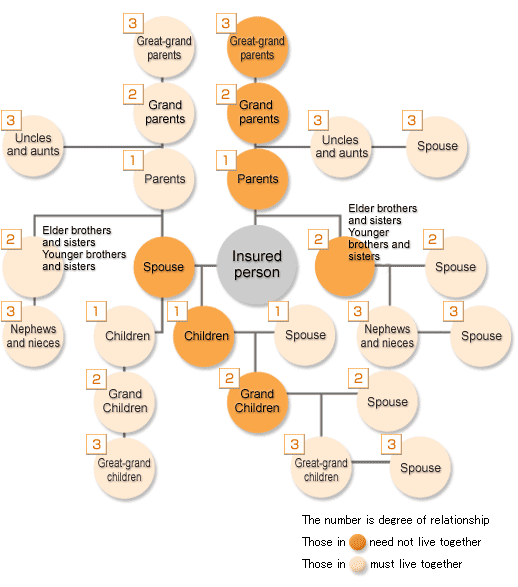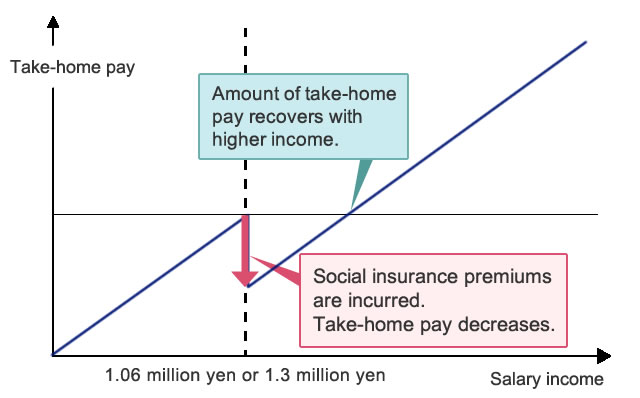Family membership
Health insurance provides insurance benefits not just to insured persons but also to their dependent family members. These family members are referred to as "dependents". Family members must meet certain conditions related to "residency in Japan," "the extent of the family relationship," and "income" before they are authorized as dependents.
- Dependents must be certified by the Health Insurance Society.
- If there is any change in your dependents, submit notification of the change within five days.
Extent of family relationship
The scope of family members eligible to be certified as dependents is legally defined. Conditions for dependent eligibility also vary depending on whether or not the family member lives with the insured person.
Family members who may live with or apart from the insured person:
- Spouse (including common law spouse)
- Children, grandchildren
- Siblings
- Parents and other lineal ascendants
Family members who must live with the insured person:
- Family members within the third degree of consanguinity other than those above
- Parents and children of the insured person's common law spouse
- Parents and children of deceased common law spouse

Income standards
To be certified as a dependent, a family member must live primarily off the income of the insured person.
| If the family member lives with the insured person | If the family member lives apart from the insured person |
|---|---|
| The family member's annual income must be less than 1.3 million yen (1.8 million yen if aged 60 or above, or a person with a disability that is eligible for receipt of Disability Employees' Pension benefits) and must be less than one-half the income of the insured person. | The family member's annual income must be less than 1.3 million yen (1.8 million yen if aged 60 or above, or a person with a disability that is eligible for receipt of Disability Employees' Pension benefits) and must be less than the amount of the allowance sent to the family member from the insured person. |
Confirmation of Cohabitation or Separation
We will ask you to submit a certificate of all household members on your resident registration to confirm whether you cohabit or live separately. Even if you are living in a two-household dwelling or on the same land, those whose resident registrations are separate will be treated as living separately.
If there is a person cohabiting with the person to be certified, the income of the cohabiting person will also be checked to determine the primary financial provider.
Handling of Unaccompanied Assignments
If the applicant dependent lives with the remaining family members due to a company-ordered unaccompanied assignment, he/she will be treated as cohabiting with the insured person. If the application subject continues to cohabit with family members remaining in the family home, there is no need to give notification of the situation as the applicant is forced to temporarily live separately from them. If there is no cohabitation with the family members remaining in the family home, they are treated as living separately and the applicant must send money and submit notification.
Remittances to Family Members Living Separately
When family members are living separately from the insured person, the insured person must send remittances that are greater than the family member's income, and the family members' livelihood must be maintained primarily by such remittances to qualify as dependents. The minimum remittance amount is based on the latest National Personnel Authority standard cost of living, by expense category and by number of household members.
Proof of Remittance
This Health Insurance Society does not accept hand delivery of living expenses as "remittance" under any circumstances, so please be sure to remit money in a form that can be proven.
- Please fill out the Remittance Amount Statement form.
- Please attach a certificate of remittance as proof of the contents of the Remittance Amount Statement.
- Remittances must be made monthly (at least once a month). If the remittance is sent in batches for multiple months at a time, it is not considered to be financial support.
Precautions if you want to make a support application for a family member of a sole proprietor
A self-employed person (sole proprietor) is a person who chooses to run his or her own business in order to make a living, a person who is economically independent in the socially accepted sense of the word, and a person who is responsible for all the results of his or her business. Therefore, if a person is a business owner but cannot live without the support of the insured person, the nature of the business and its income status must be thoroughly checked.
If the decrease in income is temporary, such as a downturn in business conditions, the person will not be recognized as a dependent. Those who do not have sufficient income on continuous, non-temporary basis, and who maintain the majority of their livelihood from the income of the insured, are eligible for certification.
Please attach a current status report to confirm the above information.
You may use any format you wish, but we ask that you declare the nature of the applicant's self-employment business, future business plans (income schedule), etc.
In addition, if the applicant's business is self-employed and employs employees and they are deemed to be paid, the applicant family member are in a position of obligation to fulfill his or her social responsibility to the employees in the socially accepted sense, and it is not considered appropriate for the applicant to be in a position to receive support as a dependent, so he or she will not be certified.
Government measures to address annual income barriers (starting in October 2023)
- Reference link
What are annual income barriers?
Annual income barriers refer to threshold income amounts that determine whether or not taxes and social insurance premiums are incurred.
Individuals who have dependent status and work part-time or other non-regular jobs will lose their dependent status if their annual income exceeds a certain figure, and become an insured person under a company health insurance plan, National Health Insurance, or other insurance system. They will then be required to pay social insurance premiums, which may result in lower take-home pay.
One of two different annual income barriers applies for social insurance premiums, depending on company size and other factors: 1.06 million yen or 1.3 million yen.

(Source: Provisional measures to address annual income barriers (Ministry of Health, Labour and Welfare))
| 1.06 million yen annual income barrier | At companies with 51 or more employees, an employee will incur social insurance premiums if certain conditions, such as when monthly wages are 88,000 yen or more (i.e., annual income is approximately 1.06 million yen or more), are satisfied. |
|---|---|
| 1.3 million yen* annual income barrier | Social insurance premiums are incurred automatically without exception, since the worker no longer meets the dependent eligibility criteria. |
- * 1.8 million yen if aged 60 or above or with a disability eligible for receipt of Disability Employees' Pension benefits
Handling for the 1.3 million yen annual income barrier
Although dependent certification is based on checking of taxation certificates and other documents from the previous year, if the worker’s annual income is expected to temporarily exceed 1.3 million yen due to longer hours because of labor shortage or other factors, the worker may choose to retain his or her dependent status simply by attaching a certificate from the employer.
(In principle, this handling is available no more than two consecutive times for a single worker.)
Handling for the 1.06 million yen annual income barrier
Companies that help increase worker income through means such as payment of allowances to encourage social insurance coverage* will be provided subsidies for a finite term.
* Allowances to encourage social insurance coverage
These allowances are intended to encourage employee insurance coverage for those working reduced hours and to reduce the burden of insurance premiums when workers who had been ineligible for insurance are newly covered by insurance.
Allowances to encourage social insurance coverage are to be paid apart from salaries and bonuses. They are not considered when calculating the standard monthly remuneration or standard bonuses used to determine insurance premiums.
- * Eligible persons: Those with standard monthly remuneration of 104,000 yen or less
- * Maximum allowance amount excluded from standard remuneration: Amount equivalent to the insurance premiums newly incurred by the employee due to insurance coverage
- * A time-limited measure not to exceed two years
New requirement concerning residency in Japan for dependent certification
From April 2020, a requirement related to residency in Japan is added to the requirements for certification of health insurance dependents. In principle, from April 1, 2020, those who do not have addresses in Japan cannot be certified as dependents (with certain exceptions - for example, students studying abroad).
Rationale underlying the domestic residency requirement
Determinations of residency are based on whether a person is registered to the basic resident register (i.e., whether or not the person has a certificate of residence). In principle, those who have certificates of residence in Japan meet the domestic residency requirement.
- Note: Even those who have certificates of residence in Japan will not satisfy the domestic residency requirement if they clearly do not reside in Japan - for example, those employed overseas.
Exceptions to the domestic residency requirement
Those whose livelihoods are recognized to be based in Japan, such as students studying abroad temporarily, are considered to meet the domestic residency requirement on an exceptional basis, even if they actually reside overseas.
[Cases qualifying as exceptions to the domestic residency requirement]
- (1) Students studying abroad
- (2) Family members accompanying an insured person posted abroad
- (3) Those traveling abroad temporarily for sightseeing, recreation, volunteer activities, or other reasons unrelated to employment
- (4) Those who enter into a family relationship to an insured person while the insured person is posted abroad
- (5) In addition to those described under (1)-(4) above, others whose livelihoods are recognized to be based in Japan in consideration of purposes of traveling abroad and other circumstances
Cases in which a person cannot be certified as a dependent even if he or she resides in Japan
Those who come to Japan on medical visas or on long-stay visas for sightseeing or recreational purposes cannot be certified as dependents, even if they reside in Japan.
Interim measure
As an interim measure, if a person who would lose his or her eligibility as a dependent due to the addition of the domestic residency requirement is hospitalized in a medical care institution in Japan as of the date of enactment of the requirement (April 1, 2020), his or her eligibility will continue during the period of hospitalization.
If there has been a change in dependents
You must take specific steps if the number of dependents increases due to marriage or childbirth or a family member is no longer eligible as a dependent for reasons such as employment, living apart from the insured person, or death. The Health Insurance Society checks the eligibility status of dependents annually.